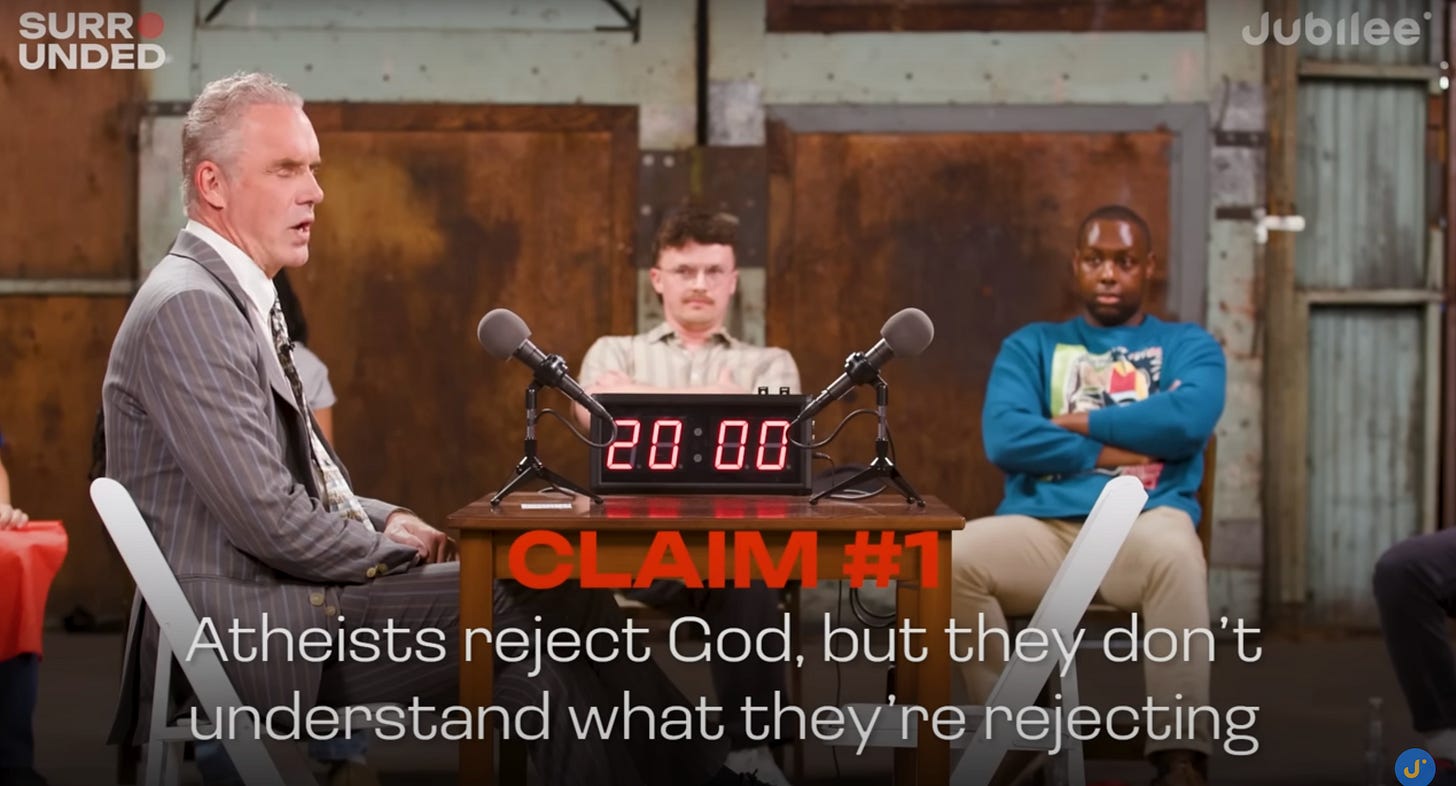Having just watched an hour and a half of Jordan Peterson “debating” a group of atheists, I have come to the conclusion that either someone secretly replaced my allergy meds with psilocybin, I have had some recent head trauma that I do not recall, or Jordan Peterson is a logically incoherent blowhard who has absolutely no idea what he is talking about, but still really wants to win the argument.
Other than the fact that Peterson recently debated Richard Dawkins (which I don’t actually hate myself enough to watch), it’s not entirely clear why they chose this as the set-up. Peterson may be something of a guru for young men who are looking to become as deeply repulsive to women as it is humanly possible for them to be, but he’s hardly a religious leader.
Nevertheless, this is what they went with. I suppose it wouldn’t have been that much of a problem if he were not so insistent on making up his own definitions of things like “God” and “Christianity,” or if he were even willing to identify himself as a Christian, which he was not.
In fact, while Peterson was refusing to say whether he was a Christian or not, one of his interlocutors pointed out that the entire event was supposed to be one Christian — presumably Peterson! — versus 20 atheists. Out of … we guess … embarrassment? they went back and changed the title of the entire video.
Quite frankly, I don’t think he knew why he was there, either.
The first assertion people were challenged to debate him on was his claim that “Atheists reject God, but they don’t understand what they’re rejecting.”

There are a number of problems with this statement, starting with the fact that “rejection” implies existence. Atheists don’t “reject” God, we simply do not believe there is one, and these are very different ideas. Conversely, if Jordan Peterson were to ask me if I were interested in eating some beef seasoned only with salt with him, and I were to say “No thank you, Jordan Peterson, that sounds like a bad time,” that doesn’t mean I don’t believe in the existence of Jordan Peterson or unseasoned beef. Those things exist, I just don’t want anything to do with them, particularly in a simultaneous fashion.
This is not remotely comparable to my feelings about the existence of God or fairies or a wrap dress that will not look horrifying on me (universally flattering, my ass).
But Jordan Peterson has one weird trick to prove his point, and it is “using a definition of God that is entirely different from what literally everyone else means when they talk about God.”
Rather, he claims that “God is the unity on which moral claims are based.” I suppose this sounds very deep to him, but it’s not remotely helpful when debating the existence of a supernatural, omnipotent, infallible, all-knowing deity who is also his own son. And a bird (or however you depict the holy spirit). He also claims that God is one’s conscience, which is also not remotely what anyone is talking about when they are talking about the Christian God.
When David, one of the atheist debaters, tried to help him understand that even if it were the case that atheists “didn’t know what they were rejecting,” that not knowing what one is rejecting does not necessarily imply belief in that thing (using the example of a Polynesian deity Peterson had never heard of before), Peterson simply seemed to not grasp what he was talking about. David then pointed out that Pew Research had found that atheists actually tend to know more about the foundational beliefs and stories than religious people, also undermining the idea that people are rejecting something they don’t understand.
“That’s because they’re more religious than they think they are,” Peterson responded. “Well, they’re concerned with deep matters, and one of the defining characteristics of someone who’s oriented in a religious direction [his face becomes increasingly smug at this point] is that they’re concerned with deep matters. In fact, it’s virtually definition.”
“Right, but they also have to identify with a religious tradition and accept the foundational stories that go along with that,” David explained.
“Well that would mean more that they’re sectarian than that they’re religious,” Peterson responded, because words have no meaning at all.
Peterson’s next claim was that “Morality and purpose cannot be found in science,” which is just a little bit of a strawman argument — although one debater did an excellent job of explaining that there is an evolutionary/survival purpose to empathy, which Peterson did not seem to grasp.
Parker, one of the debaters who came up during this section, tried to explain to Peterson that he was using a different definition of “God” than the God Christians believe in; Peterson then claimed that Cardinal John Henry Newman said that God was the “conscience” and demanded Parker respond to that, instead, because Cardinal Newman was a Christian.
Cardinal Newman, actually, did not believe that God was the conscience, but rather that the conscience was the voice of God, a divine gift from God and therefore proof of his existence. He called it the “aboriginal Vicar of Christ.” This is very different from saying that the definition of God is one’s conscience in the way that Jiminy Cricket was Pinocchio’s conscience.

But I digress!
Parker then asked Peterson if he believed in the “all powerful, all good notion of God,” to which Peterson responded “What do you mean by believe?”
“Do you think it to be true?” Parker asked.
“That’s a circular definition. What do you mean when you say you believe?” Peterson responded, and when asked what he meant by that, responded “Because you added no content to the answer by substituting the word ‘true.’”
Peterson then gave his own definition of believe, which was “If you believe something, you stake your life on it,” which is also no one else’s definition of that word. “You live for it,” he continued, “and you die for it, that’s what I mean by that. It isn’t something that you say, it isn’t something that’s associated with logical consistency, it’s not declarative, it’s not propositional, it’s not a figment of your imagination, it’s the presupposition of your attention and your action. And you’re either fragmented, in which case you worship multiple Gods, or there’s some unity at the bottom of it that makes you an unstoppable force.”
Again, not remotely the definition of that word.
Parker then asked him if he means that “you don’t believe something if you wouldn’t die for it,” to which he responds “Not really, no.” Parker then says that he believes a pen on the table exists, but if it were a life or death situation, he’d lie and say he didn’t believe it existed and that he believed Peterson would as well.
“Don’t be so sure,” he responded, menacingly, telling him that he didn’t lie to save his career or his clinical practice — referring to the fact that he was fired for insisting upon being shitty and rude to trans people.
“Would you lie to save your children or your Mom or your Dad?” Parker asked.
“I don’t think lying would save them,” Peterson responded.
Parker then asked if there were ever a situation in which lying could save someone’s life, to which Peterson asserted that this would only happen to someone “steeped in sin.”
“If you’re in Nazi Germany and there are Jewish people in your attic, and you’re trying to protect them, would you lie to the Nazis?” Parker asked.
“I would have done everything I bloody well could so I wouldn’t be in that situation to begin with” Peterson responded — and I have to say, I absolutely believe him on that one — and then accused him of “playing games” by asking him a hypothetical question. “By the time you’ve got there, you’ve made so many mistakes, that there’s nothing you can do that isn’t a sin.”
Parker tried to push him more on how being born in Nazi Germany and trying to help Jewish people was a sin, to which Peterson responded, “I think you should give up on that line of questioning.”
How in the living fuck was this man a professor of anything?
Peterson’s next claim, which also made no damn sense, was “Everyone worships something, even atheists, even though they might not know it.” And, you know, that’s a true statement, because the concept of “worship” does not necessitate a belief in the supernatural. I can say “I worship Cher” and still be an atheist all day long, because Cher is a real person who exists and (as far as we know) does not have any magical powers.
The first debater to challenge him on that was Zina, who asked him how he defines “worship” and he said “prioritize” or having a “hierarchy of preferences,” and that “whatever you’re attending to, you’re worshiping.” Or whatever you “prioritize and sacrifice for.”
The Oxford dictionary, however, defines worship as “the feeling or expression of reverence and adoration for a deity” or “adoration or devotion comparable to religious homage, shown toward a person or principle.”
These things are not the same.
She also asked him what makes someone a Christian and what makes someone not a Christian.
“Probably the deepest answer to that is willingness to shoulder your cross voluntarily and trudge uphill regardless of circumstances” he said, adding that it also means that “you believe that the cosmos itself is founded on the principle of voluntary self-sacrifice.”
They also got to talking about pre-Christian morality, during which Peterson more or less said that because the Greek philosophers and other thinkers came up with similar morals to the Christians without being Christians, that made them “like 8/12ths Christian.”
Or not at all?
Then came Danny. Danny is the one that you may have seen already from a clip that went viral from the debate. Let’s admire it here!
Danny asked, again, what Peterson meant by “worship” — which he said meant “prioritize, attend to and sacrifice for,” and, again, that is no one’s definition but his own.
Danny asked if, by that definition, Catholics or Eastern Orthodox believers “worship Mary” — a notably controversial claim. Peterson was bewildered by this and kept saying “there’s a hierarchy.” He then asked if Peterson understood Catholic doctrine and the immaculate conception, which he sort of shrugged off.
“You’re a Christian,” Danny says.
“I haven’t claimed that,” Peterson responded.
Danny was quite surprised, given that the whole point of this was supposed to be one Christian vs 20 atheists, but Peterson still refused to say whether or not he was a Christian, which I guess works for him since no words have any meaning at all as far as he is concerned.
His next claim was “Atheists accept Christian morality but deny the religion’s foundational stories” — which, even if true (not true!) would not make someone not an atheist. I can believe a lot of things religious people believe, but as long as I do not believe in a God, as long as I do not believe in anything supernatural, I am an atheist. Because words have meanings.
Ian, the first debater to respond to that claim, started out with a litany of horrible things God told people to do in the Bible (“they have a goddamned baby barbecue in Numbers”), asking Peterson if they were in line with “Christian ethics.” Peterson said no, but all of the genocide and whatnot were just taken out of context and also tried to claim, I guess, that God was perfect but people understood him imperfectly? And thus … I don’t know, got their wires crossed? But Ian points out that if God were perfect and omnipotent, he could have made people receptive to what he really meant from the beginning.
Peterson … did not get it.
The next debater, Liam, asked him what he meant by adhering to Christian morality, to which he said, “It means to aim up as high as you can, no matter what happens to you,” which I don’t think is anywhere in the Bible. Liam also pointed out that there are many philosophical and religious beliefs that have similar morals and ethics to the Bible.
This part, I have to tell you, was not easy to follow. Basically, Peterson explained that he had read about other belief systems and religions and gods and that he learned a lot from them but felt that Christianity was the most “comprehensive” of all of them. Liam said that he learned things from Christian beliefs but didn’t necessarily believe in them or God, to which Peterson responded that this was more or less the same thing as believing. Then Liam suggested that it could be seen as similar with Peterson getting something out of Taoism, which Peterson flatly rejected.
I do not understand how this man is a “public intellectual.” I do not understand how he has legions of followers hanging on his every word. It’s not even just that he’s horribly sexist or transphobic or a fascist or a giant weirdo … it’s that he’s profoundly stupid. I mean, he’s smart when it comes to being able to make what he’s saying sound especially deep or profound, but nothing of any actual substance is coming out of his mouth. He’s an excellent bullshit artist who is very good at pushing his particular agenda, but beyond that … there’s not much “there” there.
OPEN THREAD!
PREVIOUSLY ON WONKETTE!

Jordan Peterson Sad About Being Sent To ‘Reeducation Camp’ For Wayward Canadian Psychologists

‘What’s The Problem With Xenophobic Nationalism?’ Perfectly Normal Trump Voter Asks Sam Seder

Jordan Peterson Mad About Crosswalks Now, As One Is
www.wonkette.com (Article Sourced Website)
#JORDAN #PETERSON #GROWNUP #POLICEMAN
